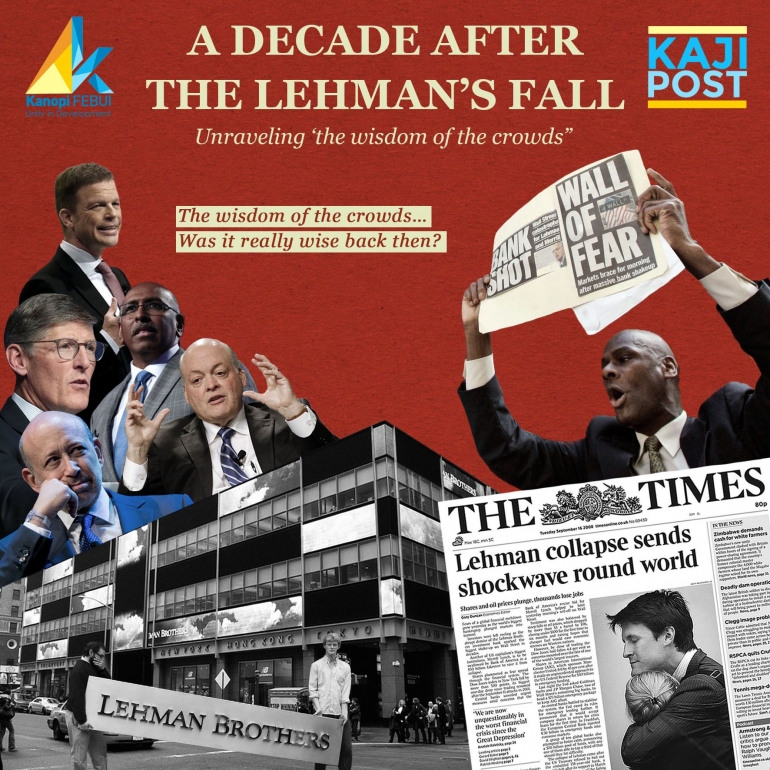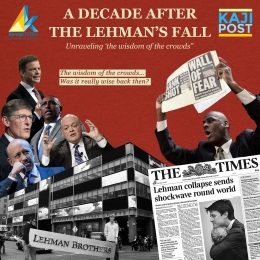Suppose that you have never tasted foods in Kanopi Restaurant in your life before and one day, you are asked to taste them by two groups of people -- one group consists of only one person (group A) and the other consists of twenty people (group B). When group A tells you that the flavor of the food in that restaurant is horrible and group B tells you that taste actually is not horrible but very delicious, which one will you believe? At that time you might not have any choices but to choose what the majority tells you, which is very delicious, because you don't have any prior knowledge regarding the flavor of the food in that restaurant. Now the question is why people tend to choose the choice of the many or in other words -- 'the wisdom of the crowds'?
In his book, The Wisdom of the Crowds: Why the Many Are Smarter than the Few and How Collective Wisdom Shapes Business, Economies, Societies, and Nations, James Surowiecki argues that collective intelligence is better than any decisions made by only single individual because it is the result of individual decision aggregation in which it has been assumed that the bigger the aggregation that we can acquire, then the collective answer will get closer to the right answer.
He even uses anecdote from Francis Galton that is related with the surprise discovery in the crowd at a county fair that accurately guessed the weight of an ox if their individual guesses were aggregated. But seeing with the lens of 2008 in which we encountered one of the worst financial meltdowns, there are definitely some factors from this wisdom that we need to further analyze and find some loopholes that we can possibly patch up.
When the bubble burst with a pop!
The year of 2008 obviously has left an unforgettable wound in our financial history. The wound itself still seems to be opened and can't be stitched closed completely after a decade. This is normal due to the shock wave that has engulfed the entire world from the effect it generated. It all began when banks started engaging in derivatives trading that we call as mortgage-backed securities .
These derivative needed housing loans as their collateral and given the condition of a boost in housing prices, eventually all actors (banks, pension funds, hedge funds, investors, etc.) were confident in getting positive return in the future. They also thought that their investments were being protected by an insurance product called as credit default swaps sold by American Insurance Group. But what really happened afterwards was the unforgiving decline of housing prices and from that they had to bear huge losses from it and eventually led investors to flee from the money market mutual fund.
If we see this sequence of events accordingly, one of the factors that drove this phenomenon from almost made everything completely fell into a dungeon was the occurrence of one actor following other actors in terms of making decisions on what and where to invest. By the nature of the wisdom of the crowd, the decision they made to follow what majority chose should had been the wiser -- in this case, the decision had to bring them all the profits they thought they would acquire. But it appeared that, their act of 'following' the others seemed to have turned its back against them.
In addition, aside from the false tendency of people to herd while they are being surrounded with uncertainty, we can refer to what has been called as the "this time it's different" syndrome that makes investors fail in recognizing the similarities of pre-crisis bubble which resulting in their exaggerative shock of the coming crisis. One example that might explain this phenomenon best is when nations in 2008 were failing in forecasting future crisis when there were signs of significant waves of capital mobility in which it will often be followed by domestic banking crisis.
Besides that, we need to include one more theory be based on psychology which called as 'representativeness' (Kahneman and Tversky, 1972). The representativeness is seen as an idea that makes people overestimate the probability of outcomes that are relatively more likely in light of recently observed data. This induces people to focus on the idea of similarities which after seeing some data, they will concentrate their forecasts on outcomes similar to the data observed and neglecting alternatives that come into sight.
The idea of representativeness soon can affect the decision of the crowds. In the 2008 financial crisis matter, an investor that observes a string of good news generated from the increase of housing prices views them as a favorable economic scenario. A series of good news is similar to a continuing boom. The investor then puts too much probability weight on that scenario and neglects the risk of bad outcomes.











